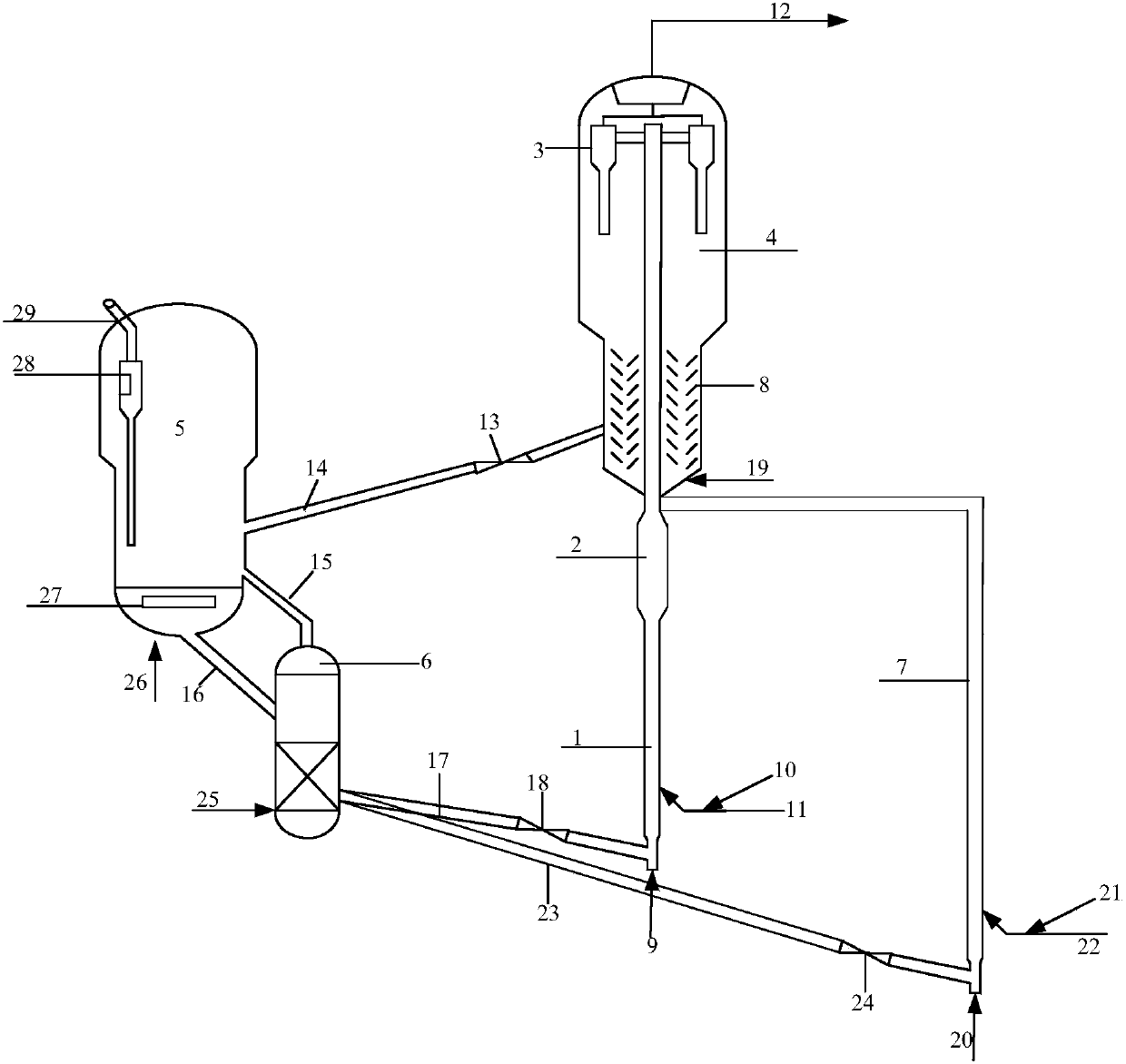Method and system for producing lower olefins and light aromatic hydrocarbons
A technology for low-carbon olefins and production methods, which is applied in the fields of hydrocarbon cracking to produce hydrocarbons, processing hydrocarbon oil, organic chemistry, etc., can solve the problems of not maximizing propylene production, and achieve the effect of improving economic and social benefits and promoting transformation and development.
- Summary
- Abstract
- Description
- Claims
- Application Information
AI Technical Summary
Problems solved by technology
Method used
Image
Examples
Embodiment approach
[0077] According to a preferred embodiment of the present invention, when the method is carried out in a riser reactor, the method comprises the steps of:
[0078] The heavy oil raw material enters the first reaction zone of the first riser reactor, contacts with the regenerated catalyst from the regenerator, and undergoes the first catalytic cracking reaction. The second catalytic cracking reaction is carried out in the reaction zone, and the reaction product and unborn catalyst enter the settler for gas-solid separation. The separated reaction product extraction device is further separated to obtain light olefins, light aromatics, middle distillates and other products; after hydrogenation, the middle distillate enters the second riser reactor to contact with the regenerated catalyst for reaction, and the reaction products and to-be After the raw catalyst is mixed with the reaction product in the second reaction zone of the first riser reactor and the mixture of the raw catal...
preparation example
[0089] The catalytic cracking catalyst preparation method used in the embodiment is briefly described as follows:
[0090] 1) Filter the mother liquor from the crystallized β molecular sieve (produced by Changling Catalyst Factory), wash with water, filter and dry; roast the dried molecular sieve in the air for 6 hours at a temperature of 550°C to remove the templating agent Get above-mentioned molecular sieve 100 grams (dry basis) and add in the NaOH solution of 1000 grams 2.4% by weight, be warming up to 65 ℃, after reacting for 30 minutes, after rapidly cooling to room temperature, filter, wash to filtrate neutrality. Then, add 800 grams of water to the filter cake to make a slurry, add 40 grams of NH 4 Cl, heated to 75°C, exchanged for 1 hour, to Na 2 The O content is lower than 0.2% by weight, filtered and washed to obtain a molecular sieve filter cake; take 50 grams (dry basis) of the above-mentioned molecular sieve and add water to prepare a molecular sieve slurry with...
Embodiment 1
[0093] This example is used to illustrate the method of the present invention.
[0094] according to figure 1 The process shown in the test is carried out on a medium-sized device. The heavy oil feedstock is atmospheric residue Z, the catalyst is A, and the preheated feedstock oil (350°C) enters the straight section of the first riser reactor (that is, the first reaction zone) to react at the bottom, and the reaction oil enters the diameter-expanding section of the first riser reactor from the outlet of the first reaction zone (that is, the second reaction zone, the ratio of the height of the straight cylinder section to the diameter-expanding section is 0.6:1, The ratio of the inner diameter of the enlarged diameter section to the straight section is 1.5:1) to continue the reaction, and the reacted stream enters the closed cyclone separator, the reaction product and the catalyst to be produced are separated rapidly, and the reaction product is further separated to obtain meth...
PUM
 Login to View More
Login to View More Abstract
Description
Claims
Application Information
 Login to View More
Login to View More - R&D
- Intellectual Property
- Life Sciences
- Materials
- Tech Scout
- Unparalleled Data Quality
- Higher Quality Content
- 60% Fewer Hallucinations
Browse by: Latest US Patents, China's latest patents, Technical Efficacy Thesaurus, Application Domain, Technology Topic, Popular Technical Reports.
© 2025 PatSnap. All rights reserved.Legal|Privacy policy|Modern Slavery Act Transparency Statement|Sitemap|About US| Contact US: help@patsnap.com

